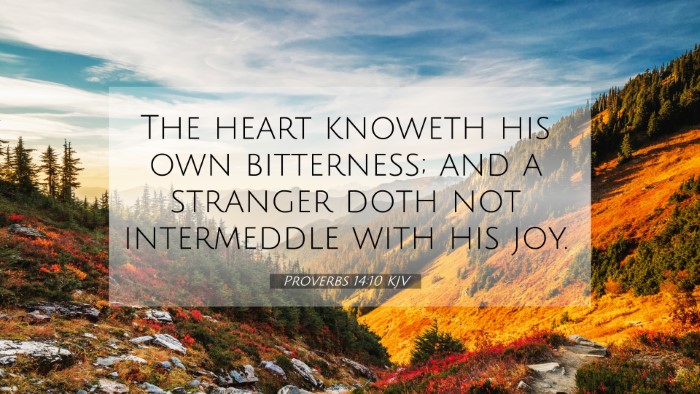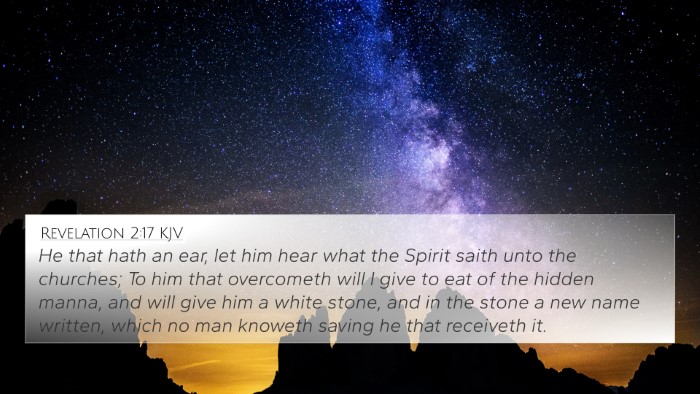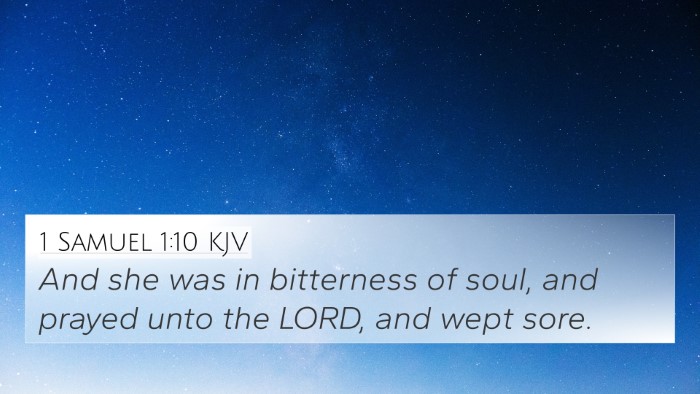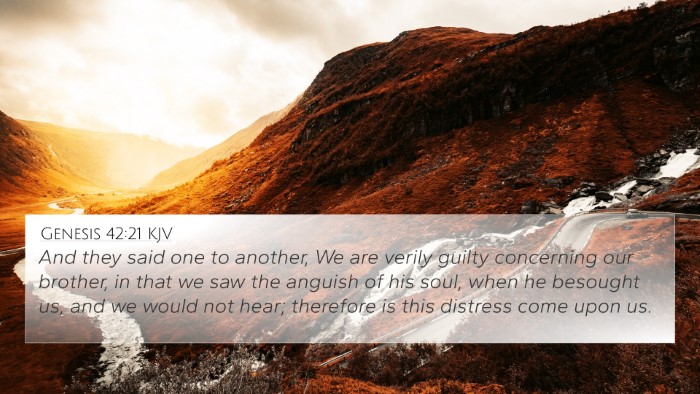Understanding Proverbs 14:10
Proverbs 14:10 states: "The heart knows its own bitterness, and a stranger does not share its joy." This verse highlights the profound depth of human emotion and the personal nature of our feelings. Here, we will delve into the interpretations derived from classical public domain commentaries, laying out insights from revered biblical scholars such as Matthew Henry, Albert Barnes, and Adam Clarke.
The Depth of Personal Experience
Matthew Henry emphasizes the unique experience of individual sorrow and joy. He notes that each person's heart has its own sorrows which can only be fully understood by that individual. This signifies the importance of empathy and the limits of external understanding.
Emotional Isolation
Albert Barnes elaborates on the idea that joy and sorrow are deeply personal experiences. According to Barnes, while we can observe others' happiness, we may never grasp its full essence unless we share in it directly. This notion encourages us to cultivate deeper connections with others, acknowledging that true understanding comes with shared experiences.
Interpersonal Relationships and Empathy
Adam Clarke adds to this discourse by pointing out the need for interpersonal relationships built on empathy. He highlights that our emotional experiences create walls that others cannot easily penetrate. The bitterness one carries is often private, making it a solitary experience, while joy can feel diluted in the absence of shared context.
Connecting Themes in Scripture
In studying Proverbs 14:10, we find thematic connections to various other Bible verses that offer deeper insights into the nature of human emotions and relationships. Below are several cross-referenced scriptures that relate to this verse:
- Ecclesiastes 3:4: "A time to weep, and a time to laugh; a time to mourn, and a time to dance." This verse underscores the cyclical nature of life's emotions.
- Psalm 34:18: "The LORD is near to the brokenhearted and saves the crushed in spirit." It emphasizes God's understanding of individual pain.
- John 16:22: "So also you have sorrow now, but I will see you again, and your hearts will rejoice, and no one will take your joy from you." This reflects on the personal nature of joy following sorrow.
- 1 Corinthians 12:26: "If one member suffers, all suffer together; if one member is honored, all rejoice together." It speaks to communal empathy in emotional sharing.
- 2 Corinthians 1:4: "Who comforts us in all our affliction, so that we may be able to comfort those who are in any affliction..." This shows how personal suffering can lead to greater empathy towards others.
- Hebrews 4:15: "For we do not have a high priest who is unable to sympathize with our weaknesses, but one who in every respect has been tempted as we are, yet without sin." This illustrates a celestial understanding of human emotions.
- Philippians 2:4: "Let each of you look not only to his own interests, but also to the interests of others." This verse urges us towards compassion and understanding of others’ sentiments.
Cross-Referencing and Understanding Emotions
Utilizing tools for Bible cross-referencing can enhance our understanding of thematic connections and emotional truths. The ability to interlink scriptures allows for deeper insights into how various parts of scripture speak to human experiences. For example:
- Bible Concordance: Handy for identifying key terms and concepts.
- Bible Cross-Reference Guide: A systematic approach to finding verses that relate to specific themes.
- Cross-Reference Bible Study: Techniques to engage with Bible texts in a relational manner.
Conclusion: The Significance of Proverbs 14:10
Proverbs 14:10 invites us to reflect on the nature of our emotional reality and the significance of individual experiences. By understanding our own hearts and the hearts of others, we can foster stronger bonds of empathy and compassion. The aforementioned commentaries and verses provide a foundation for exploring the complexities of human emotions, enriching our understanding of scripture, and encouraging meaningful connections with fellow believers.




















